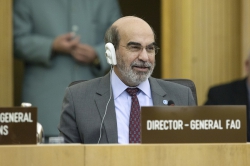FAO unions lambast Graziano for 'demotivating' staff

ROME – FAO staff representation bodies have lambasted Director General José Graziano Da Silva at the UN agency’s annual council, saying that under his leadership “FAO seems to continue on a path to demoralize and demotivate its staff.”
Representatives of AP in FAO and UGSS received tumultuous applause from donor member state representatives as they lashed out at the Brazilian DG and his management team saying “staff expertise and competencies are not considered in redeployment excercises and selection processes, just as mobility is more about meeting quotas than it is about the real technical demands of the Organization.”
“Add to this the growing trend to employ staff on temporary contracts, where the decision for rneal is centralized, and from staff to non-staff human resources being used for core functions, with the resulting constant struggle to retain full employment without full accountability, independence and transparency, and it becomes apparent how hiring managers lack flexibility and fail to meet the minimum requirements for workforce planning.”
The SRBs’ input for positive changes within FAO os rarely taken into account meaningfully when changing policies of procedures, they continued.
In recruitment “the decision making processes … are overly centralized, and therefore unable to ensure … robust and transparent selection based on merit … This is of particular concern to staff since the de-facto elimination of promotions means that the selection for a new post now represents the sole career advancement opportunity.”
“It has therefore become cause for great concern that the recruitment decisions … are no longer following clear and transparent procedures … but rather are taken following an unpublished set of rules covered by the all-encompassing confidentiality clause. We have witnessed appointments within both the GS and P catergories made without standard interviews, and external candidates selected for positions they demonstrably were not qualified for, on the basis of unknown criteria, in clear disregard of Staff Regulations and the UN Charter.”
The staff bodies highlighted the murky nature of recruitment at FAO under which applicants are invited to make “expressions of interest” rather than normal applications.
“This approach has also been taken in the recruitment of consultants, as FAO has decided to publish calls for expressions of interest for this vulnerable category just recently. This unclear selection process is being applied to jobs that should be time-bound in nature, thereby institutionalizing the role of non-staff human resources rather than giving them a fair chance to participate in a transparent staff selection process with all the benefits that entails.”
The SRBs also criticized the unilateral decision by FAO management to close the Commissary and raised concerns about the FAO internal justice system.
“The outcome is too often familiar,” they said, “findings in favour of the appellant are rejected by the Director general… this approach has resulted in several judgements being handed down from the International Labour Organisation Administrative Tirbunakl (ILOAT) against FAO and WFP.”
On the thorny question of retirement age, the SRbs pointed out that “FAO is the only organization that has decided not to implement the International Civil Service Commission decision two years ago to raise the mandatory age of separation (MAS) to 65 years for staff in service prior to Jan. 1 2014.”
“Presumably FAO’s reluctance to follow the common system is linked to what seems to be a strategy to diminish the number of staff who would be entitled to pension at the end of their careers,” the SRBs said.
The SRBs also underlined unfair policies regarding rental subsidies for staff in the field and skullduggery over medical insurance arrangements.
jp


